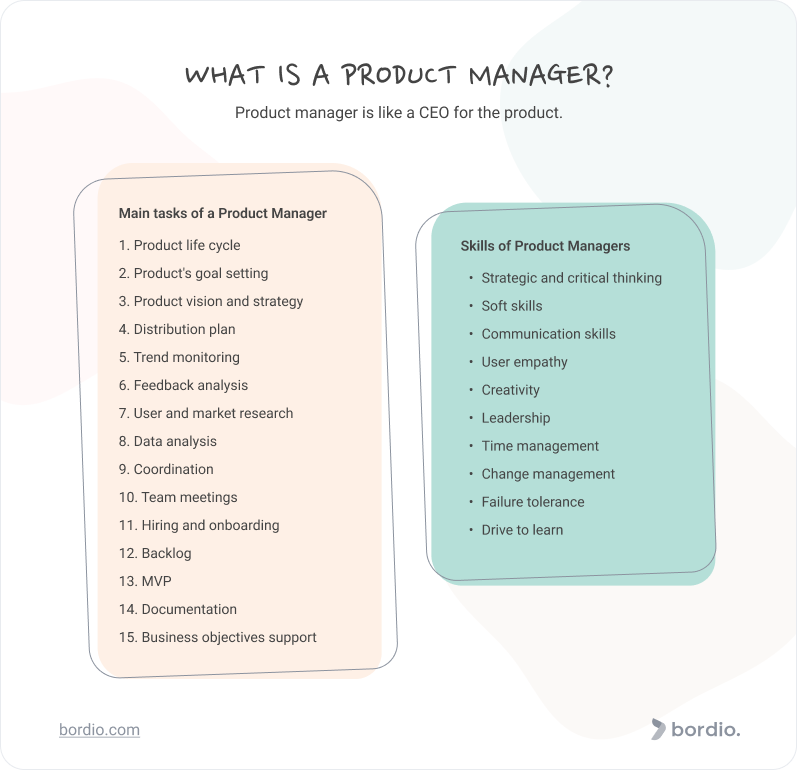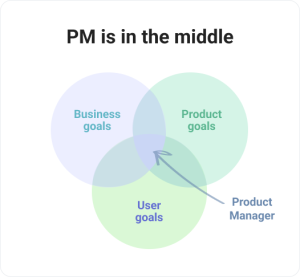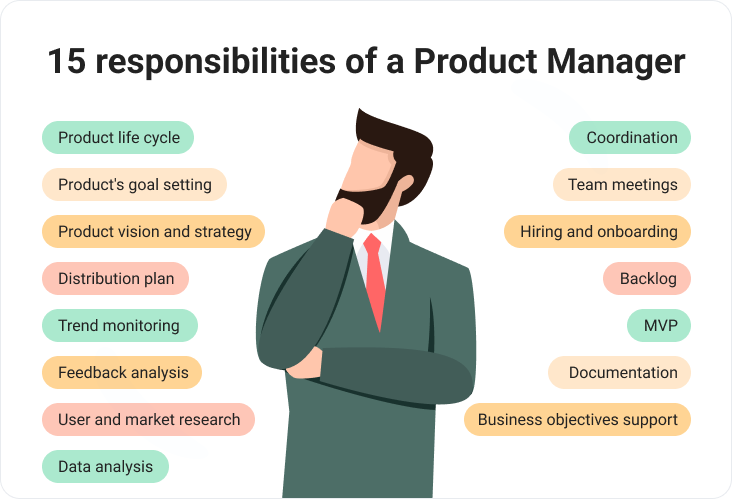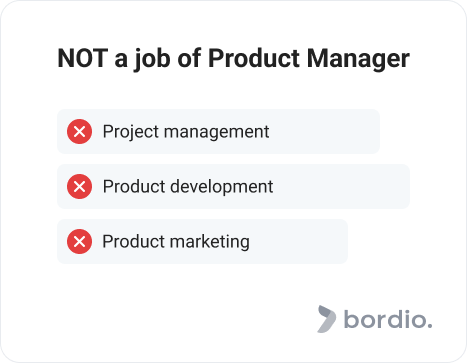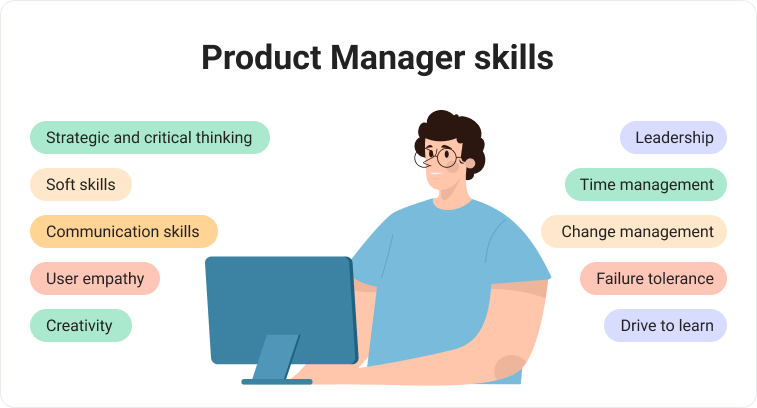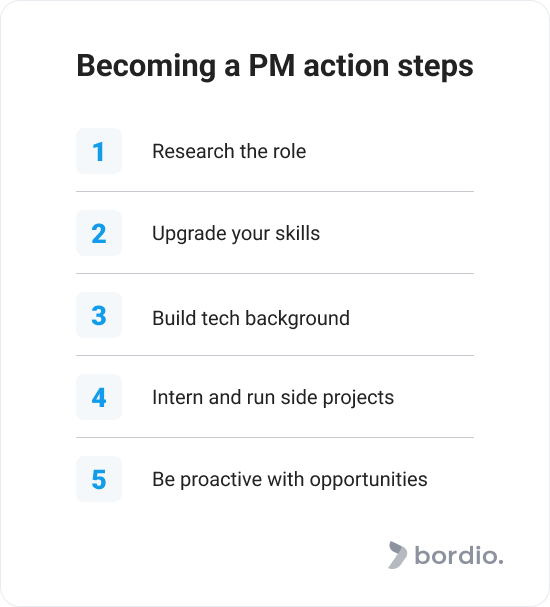We’ve already talked a lot about projects and project managers in this blog. Now is the time to discuss product managers.
Yes, that’s right – a product manager and a project manager are actually not the same!
Product managers.. manage products. We understand that. But what does it actually mean? In this article, we will shed light on the concept of product management, share who product managers are and what they do, and how you become one.
What exactly is a Product Manager?
The product manager is like a mini-CEO for the product.
Product managers are professionals who are fully responsible for the product strategy, including development, promotion, financials, and product team management, without necessarily working on all those aspects themselves.
Important note: product management means different things in different companies. One product manager is expected to manage a product’s entire lifecycle, whereas their colleague is only responsible for parts of the product management process, such as sales and product marketing, or the opposite – research and development.
A product manager (sometimes also referred to as the product owner) is often the key to product success and high customer satisfaction. A good product manager uplifts the product or service, a bad one ruins it along with the customer experience.
The product manager is in the middle between business, product, and user goals.
What does a Product Manager do?
Product managers are those magical creatures that understand and can do a lot of things. They are both visionaries and linear workers, not afraid of hard work.
Here is a list of main tasks and roles that product managers are typically responsible for:
#1 Product life cycle management
Product lifecycle management means looking after the product development process from start to finish. This involves the ideation stage where we brainstorm what the future product will look like, manage the development process, and release the finished product to the market.
#2 Products’ goal and objective setting
A product’s success is inseparable from precise and efficient goal-setting.
Before the product is created, we need to have the answers to the following questions:
- Who is this product for? Identifying our target audience.
- What problems does it solve? Do clients know about those problems?
- What makes it unique? How are we different from everyone else?
- Who are our competitors and how do we beat them? Our competitive advantage.
- What are our goals with the product? E.g. brand awareness or market acquisition.
#3 Vision and strategy
Product’s vision and strategy development, including creating a product roadmap, discussing the development methodology for the development or engineering team, and confirming the go-to-market strategy. Strategy can be built in work management tools.
#4 Distribution channels review and updates
Good partners are just as important for the product’s success as its quality. Sticking to outdated distribution channels can negatively influence the product’s performance on the market. Product managers work on distribution analysis together with marketing and business development teams.
#5 Trend monitoring
Watch out for trends in the industry and anything that affects the product directly or indirectly. Product managers must also stay up to date with new productivity tools and task planner apps, such as Bordio’s online calendar planner, that can make their life easier and work more efficiently. It will also be useful to use different teamwork planner tools like Bordio planner online.
#6 Customer feedback and requirements analysis
Product managers should always be in touch with clients, seek to understand them better, and listen to what they have to say about the product or their wishes/experiences in general. A good product manager will be able to filter out feedback and find the next gem – a feature or a solution that clients might not even yet realize they need.
#7 User and market research
Conducting research on product/service, market, and competitors. The goal is to create or enhance the product to help the customers better and also to make the product more competitive. User research is imperative for a high-quality product management process.
#8 Data analysis
Data analysis includes many things at the same time: sales reports, product development logs, and market research results. A product manager doesn’t have to be a data scientist, but they must be comfortable with going through big chunks of data.
#9 Coordination
Products and services are created and supported by professionals across departments (e.g. by the sales team and QA team) and everyone must work in sync and be on the same page which can be a challenge. There are also key stakeholders whom you must satisfy and get approvals from for your plans and goals. The product manager distributes and collects up-to-date information across all stakeholders, so a lot of the time in their weekly planners is assigned to meetings.
#10 Scheduling and handling team meetings
If you use Agile and Scrum frameworks then you’d be in charge of all 5 Scrum ceremonies, such as daily stand-up, and backlog refinement, and other meetings should be assigned to your best schedule builder.
#11 Hiring and managing a product team
The product management team is one of the main responsibilities of the product manager. Sometimes they have to do the hiring, other times they are provided with fully equipped product teams. But in any case, product managers need to be able to filter out the candidates, onboard and integrate them into the existing team, and manage the latter successfully.
#12 Backlog management
The product backlog has to be formed, prioritized, actualized, and worked through. Each task in the backlog needs to be assigned a priority and an owner, checked for co-dependencies, monitored for completion, then reviewed and approved.
#13 MVP creation
A minimum viable product (or MVP) is the first bare version of the product that is created to be tested with end-users before development teams start the hard-core work. We talk more about MVP types in the lean startup article, so check it out to see what kinds of MVPs exist out there.
#14 Product and process documentation
Don’t we all love paperwork? As daunting as it may seem, documentation is unavoidable in a product manager’s job. The product management process is tricky, it takes a lot of time, knowledge, and people. Documentation allows keeping track of what was done, when and by who. All those details can seem insignificant at the moment but will make a huge difference five months later when something will require extra work and you will be scratching your head trying to remember what was actually done back then.
#15 Support all business objectives of the company
The product management strategy needs to be aligned with the company’s goals. It can be reflected through the product design, feature set, approach to development and team management, and everything else.
The tricky part about a product management job is that you don’t usually work with straightforward frames like Waterfall or PRINCE2. Their work process resembles 10 ping-pong matches played simultaneously at the same table. There are tons of back and forth, causing major confusion and delays if you’re not hands-on with everything.
What does a product manager NOT do?
When you look at the list of the product manager’s core responsibilities, you might come to the conclusion that they take care of anything and everything but it’s not 100% true.
Surprisingly, there are tasks and roles that a product manager is not responsible for.
#1 Project management
This one is a little controversial because in some cases a product manager = a project manager. But it only works if the product = the project. Working on anything outside of product management, for example, switching to a new ERP system or an office re-design, would not be a responsibility of a product manager.
#2 Product development
When it comes to creating the solution and/or coding, the product manager is not involved in the work. They are managing and monitoring, guiding the team in the right direction, and ensuring the company’s vision is followed and criteria are met. However, the product manager is not expected to be technically proficient to produce the solution themselves.
At the same time, product managers who have the technical skills tend to feel more comfortable managing the development process and can contribute by building an optimized process.
#3 Marketing
Marketing and sales are outside of the product manager’s scope. They can lead the strategy and guide the marketing guys, but it is still the job of the marketing department to come up with ideas and solutions because they are ultimately the experts.
How to become a Product Manager?
A product manager can theoretically have any background but it helps to have some relevant experience, whether through work or education, in the field where you intend to work.
A product manager works at the intersection of multiple areas, ranging from product development and user experience to sales and design. The scope of the role is truly grand, and the product manager keeps on learning and using everything they know in their work.
The skills you need to become a product manager
Formal education doesn’t play an overly huge role in building a product management career but the skills you possess do.
Here is the key set of skills you need to master to succeed as a product manager:
- Strategic and critical thinking – goes without saying. Long-term strategic thinking and the ability to look at all incoming information critically are a must in product management.
- Soft skills. Product managers need to manage a team AND be able to identify and notice the challenges and needs of the end-users. It’s a lot of human interaction!
- Communication skills – as an extension of soft skills – you can’t really be shy and deeply introverted in this role. Product management is all about being outgoing and easy to approach. They should also be willing to reach out and deal with all kinds of personalities.
- User empathy. Product managers are working on understanding what’s wrong with the product and what can be improved for the end-users benefit. It’s important to be empathetic and have a gut feeling about what’s needed and wanted, and what will go unnoticed.
- Creativity, both in a traditional sense but also with regards to problem-solving. In product management, you come across the most peculiar issues that can’t be dealt with unless you think outside the box.
- Leadership skills are also a must in product management. Product team members work under stress and have to create something great out of nothing. They need a leader who will inspire, motivate, and push them to do their best.
- Time management is absolutely critical for all product managers. Those who are good with time can also plan the product development process better and build their team’s online to-do lists and calendar schedules efficiently.
- Change management is a skill that should be taught in high school, in our opinion. Changes happen all the time and it’s a part of modern life. Agile Scrum methodology treats change as an opportunity for improvement, but the general perception of change is still more negative. Product managers can’t afford the luxury of ignoring the change or not being prepared for it because they risk creating an obsolete product if they don’t read the room.
- Acceptance of failure. Nobody likes to feel like a loser but we all fail sometimes. Failure is a rough but very effective teacher, so, in a way, failures are good. Making the right conclusions and learning from one’s mistakes is a healthy habit to have, and a must-have in product management.
- Continuous improvement attitude. Circumstances change so fast that product managers are required to learn and grow continuously to stay competitive and remain good professionals.
On top of the skills, you would also increase your chances of becoming a product manager if:
- You have some kind of higher education related to the field (be it engineering, marketing, business, or something along those lines).
- Practical experience. It’s hard to become a product manager without any experience. You can build it at your workplace if you are offered this position based on your previous roles or you can start with junior associate roles and internships.
- You know and use productivity tips and techniques that allow you to accomplish many things within a short time span. Product managers are always under pressure, so you have to be physically and mentally prepared for it, as well as know about the ways to balance and manage your workload effectively, for example, with smart daily planner tools.
Action steps to become a product manager
Every product manager’s path is unique but the six steps below will guide you in the right direction:
Research the product management role
Talk to current product managers, watch videos and read articles online, and read books. Make sure you fully understand what product management is before you commit to it.
Take a short-term course to get a better feel of the role. You can do online courses on platforms like Udemy or Coursera, or apply for formal certifications which might take more time and be more expensive, but will look good on your resume.
Work on your skills
Take a look at the product management skills we mentioned above, identify which ones require work on your end, and start improving them. The hardest work in life is working on yourself, and the sooner you start the self-improvement journey, the better.
Build your background in engineering, data science, and computing
Most product managers require some basic knowledge in those fields, and even if it’s formally not necessary, in 9 out of 10 cases it will make your professional life easier and better. You don’t need to get advanced there but acquainting yourself with basic concepts and terminologies will make a world of difference.
Do internships or side projects to get that practical experience
Try working on several products to get a hands-on understanding of the product management role and daily operations. Don’t skip the unpaid internships and do them too (if you can afford them). Even a 2-week internship will give you a bunch of insights. Plus, it will be much easier for you to read the theoretical articles and watch courses with the real-life experience behind your back.
Look for opportunities and be proactive
Within your current company, look for product management opportunities and apply for projects where you can be responsible for all (or most) elements of the process. In some companies, you can combine the roles and work on mini-projects that take 15-20% of your workday. If there is nothing like this in your current employment, take the initiative and volunteer.
Final thoughts on product managers
The product manager title has become extremely prestigious and sought after over the past years. At the same time, the role of a product manager is irritatingly poorly defined.
For anyone aspiring to become a product manager, it means that their career path is likely to be unique as there is no huge blueprint for how one becomes a product manager and masters the field. To a good product managers are recommended to try using tools like task organizing app and online weekly schedule planner to work and monitor activities of team.
We hope that our tips and insight have made the product manager role clear to you. If you are exploring your career options at the moment, make sure to check out the how to become a project manager guide that we’ve prepared too.

